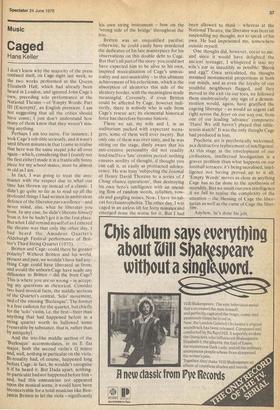Music
Caged
Hans Keller
1 don't know why the majority of the press confined itself, on Cage night last week, to the two works performed at the Queen Elizabeth Hall, which had already been heard in London, and ignored John Cage's own, preceding solo performance at the National Theatre — of 'Empty Words: Part III (Excerpts)', an English premiere. I am not suggesting that all the critics should have come; I just don't understand how many of them knew that they weren't missing anything.
Perhaps I am too naive. For instance, I took Cage's sub-title seriously, and it wasn't until fifteen minutes in that I came to realise that here was the same stupid joke all over again — which, considering that .1 (surely not the first either) made it in a frantically funny Piece for my school mates, must be almost as old as I am.
In fact, I was going to treat the antimaster with the respect due to what our time has thrown up instead of a classic. I didn't go quite so far as to read up all the Profound things I had written in ambivalent
defence of the liberator par excellence — and never mind, alas, what he liberates you from. In any case, he didn't liberate himself
from it, for he hadn't got it in the first place.
But what I did remind myself of as I entered the theatre was that only the other day, I
had heard the Amadeus Quartet's Aldeburgh Festival performance of Britten's Third String Quartet (1975).
Britten and Cage: could there be greater Polarity? Without Britten and his world, Present and past, we wouldn't have had any thing Cage could have liberated us from; and would the unborn Cage have made any difference to Britten — did the born Cage'?
This is where you are so wrong — in accepting my questions as rhetorical. Consider two hard musical facts, the middle sections of the Quartet's central, 'Solo' movement. and of the ensuing 'Burlesque'. The former is a free cadenza for the quartet, but chiefly for the 'solo' violin, i.e. the first — freer than anything that had happened before in a string quartet worth its hallowed name (venerable by substance, that is, rather than by antiquity). And the trio-like middle section of the `Burlesque' accommodates, in its E flat major, both the second violin's G minor and, well, nothing in particular on the viola. Bi-tonality had, of course, happened long before Cage; in fact, he wouldn't recognise It if he heard it. But Dada apart, nothing
in-particular had not happened before him — and, had this unmusician not appeared
Upon the musical scene, it would have been inconceivable for a total musician like Benjamin Britten to let the viola significantly his own string instrument — bow on the 'wrong side of the bridge' throughout the trio.
Britten was an unqualified pacifist; otherwise, he could easily have murdered the dedicatee of his late masterpiece for his observations on this double debt to Cage. But that's all part of the story: you could not have expected him to be alive to his own, inspired musicalisation of Cage's unmusicality and anti-musicality — to this ultimate achievement of his eclecticism, which is the absorption of aleatorics this side of the aleatory border, with the meaningless made meaningful. Coversely, if even Britten could be affected by Cage, however indirectly, there is nobody who is safe from Cage's rescue act; its elemental historical force has therefore become historic.
There we sat, my wife and I, in an auditorium packed with expectant teenagers, some of them well over twenty. But only one of them was over sixty, and he was sitting on the stage, dimly aware that his anti-creative personality did not readily lend itself to a 'late' creative period: nothing ensures senility of thought, if thought you
can call it, as easily as protracted adolescence. He was busy 'subjecting the Journal of Henry David Thoreau to a series of 1 Ching chance operations', thus destroying his own hero's intelligence with an unend ing flow of random words, syllables, vowels and gurgling noises. Now, I have no tal
ent for claustrophobia. The other day, I was caged in an airless lift for forty minutes and emerged none the worse for it. But I had been allowed to think — whereas at the National Theatre, the liberator was bent on suspending my thought, not to speak of his own. He had imprisoned me, somewhere outside myself.
One thought did, however, occur to me, and since it would have delighted the ancient teenager, I whispered it into my wife's ear as inaudibly as possible: 'Bacon and egg?' Once articulated, the thought assumed monumental proportions in both our minds, and as even the loyalty of our youthful neighbours flagged, and they moved to the exit via our toes, we followed them unobtrusively: any sign of a demonstration would, again, have gratified the cageing liberatpr — as would an urgent call
right across the foyer on our way out, from one of our leading 'advance' composers:
'Hans! We still haven't played that tabletennis match!' It was the only thought Cage had produced in him.
Psychotic art is psychotically welcomed, as a destructive replacement of intelligencd.
At this stage in the envelopment of our civilisation, intellectual hooliganism is a graver, problem than what happens on our football terraces: it's being moralised, intel ligence not having proved up to it all. 'Empty Words' moves as close as anything Cage has so far done to the apotheosis of stupidity. But we insult our own intelligence if we fail to realise the complexity of the
situation — the blessing of Cage the libertarian as well as the curse of Cage the libertine.
Anyhow, he's done his job.














































 Previous page
Previous page